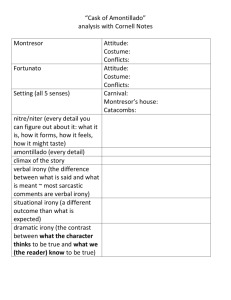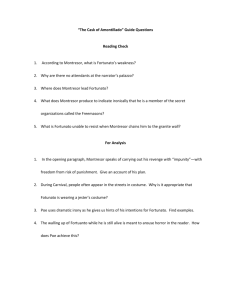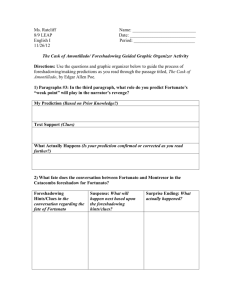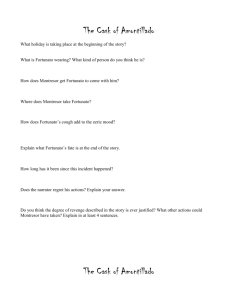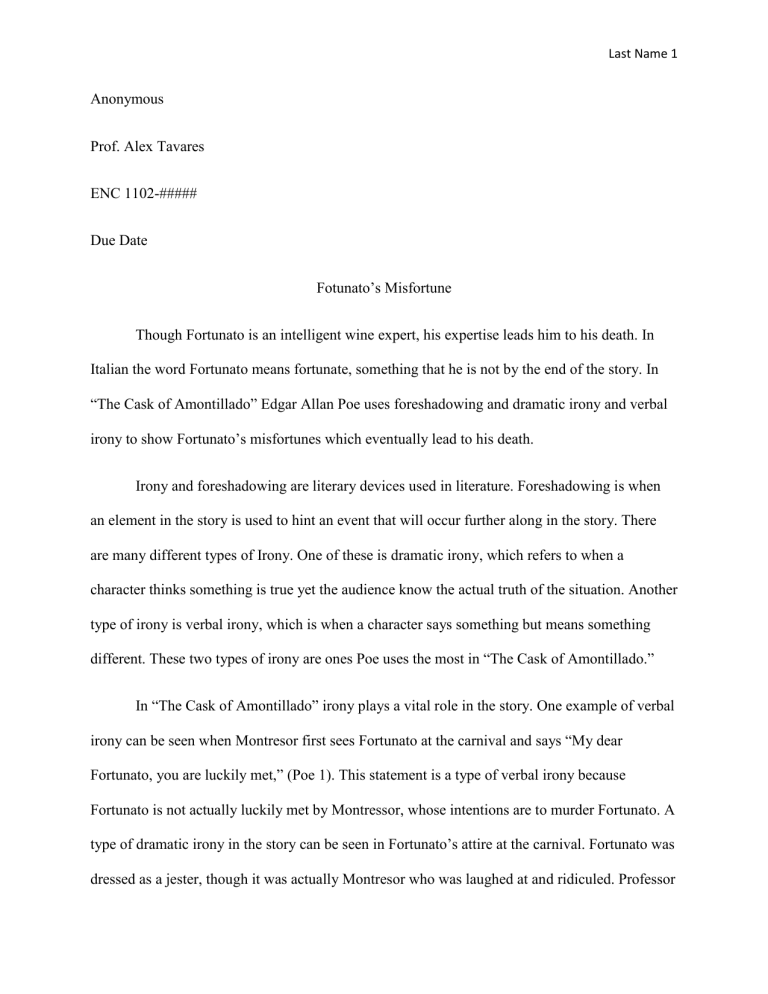
Last Name 1 Anonymous Prof. Alex Tavares ENC 1102-##### Due Date Fotunato’s Misfortune Though Fortunato is an intelligent wine expert, his expertise leads him to his death. In Italian the word Fortunato means fortunate, something that he is not by the end of the story. In “The Cask of Amontillado” Edgar Allan Poe uses foreshadowing and dramatic irony and verbal irony to show Fortunato’s misfortunes which eventually lead to his death. Irony and foreshadowing are literary devices used in literature. Foreshadowing is when an element in the story is used to hint an event that will occur further along in the story. There are many different types of Irony. One of these is dramatic irony, which refers to when a character thinks something is true yet the audience know the actual truth of the situation. Another type of irony is verbal irony, which is when a character says something but means something different. These two types of irony are ones Poe uses the most in “The Cask of Amontillado.” In “The Cask of Amontillado” irony plays a vital role in the story. One example of verbal irony can be seen when Montresor first sees Fortunato at the carnival and says “My dear Fortunato, you are luckily met,” (Poe 1). This statement is a type of verbal irony because Fortunato is not actually luckily met by Montressor, whose intentions are to murder Fortunato. A type of dramatic irony in the story can be seen in Fortunato’s attire at the carnival. Fortunato was dressed as a jester, though it was actually Montresor who was laughed at and ridiculed. Professor Last Name 2 Charles N. Nevi, of the department of English in Medford, Oregon, writes about the irony in Fortunato’s dress when he says, “Fotunato’s dress is ironic, for a jester is not just a man to be laughed at; he is a man who makes others laugh by being aware of the frailties of mankind and then ridiculing them, but Fortunato is aware of very little and who ridicules nothing. It is Montresor who came closer to the role of jester,” (Nevi par.8). Here Professor Nevi suggests that Montresor is the one who is actually ridiculed and should be a better fit in the jester dress. These examples demonstrate Fortunato’s ironic misfortunes that lead to his eventual death. Foreshadowing is another literary device highly used in “The Cask of Amontillado.” An early instance of foreshadowing is seen in the title “The Cask of Amontillado.” In the title the word “Cask” closely resembles the word casket which refers to where a person lays after death. The title quickly draws attention that the story involves the death of a person. Another very important use of foreshadowing is in the first sentence in “The Cask of Amontillado.” Poe starts the story off with Montresor stating, “THE thousand injuries of Fortunato I had borne as I best could, but when he ventured upon insult I vowed revenge” (Poe 1). This statement was signifying the last time montresor was going to take Fortunato’s insults. In the statement, Montresor vowed revenge upon Fortunato for all of the hurt he has caused him. This example foreshadows the death of Fotunato as Montresor states that he is fed up with the insults. Foreshadowing Fortunato’s death gives us and early view of Fortunato’s misfortune. The uses of foreshadowing and irony play a vital part in “The Cask of Amontillado.” Foreshadowing in the story hinted towards the death of Fortunato. The different types of irony demonstrate how the different elements of the story helped us understand the consequences Fortunato faces for his hurtful ways. Last Name 3 Works Cited Nevi, Charles N. “Irony and ‘The Cask of Amontillado’.” The English Journal 56.3 (1967): 461-463. JSTOR. Web. 10 October 2011. Poe, Edgar Allan. “The Cask of Amontillado.” Literature: Reading, Reacting, Writing. Ed. Laurie G. Kirzner and Stephen R. Mandell. 6th ed. Boston: Thomson Wadsworth, 2007. Print.
